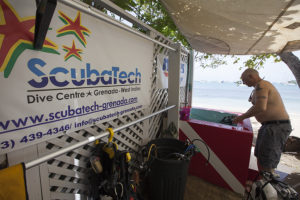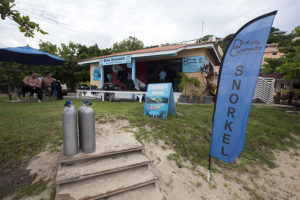 Dive stores have changed quite a bit throughout my diving career. In the early days of the internet, I once co-owned a shop. It was a struggle every day to serve our customers well and still compete with declining prices found on the internet. Manufacturers required us to book large orders and buy gear a full season in advance, while we still had lots of stock in the shop. The bills would come due even before our busy season began. Seemingly loyal customers would visit, try on a wetsuit, then order it online for a price we could not match, forgetting that we had to find a way to cover the costs of the compressors and good repair shop. We could not afford to stock all the sizes and colors that were available instantly online.
Dive stores have changed quite a bit throughout my diving career. In the early days of the internet, I once co-owned a shop. It was a struggle every day to serve our customers well and still compete with declining prices found on the internet. Manufacturers required us to book large orders and buy gear a full season in advance, while we still had lots of stock in the shop. The bills would come due even before our busy season began. Seemingly loyal customers would visit, try on a wetsuit, then order it online for a price we could not match, forgetting that we had to find a way to cover the costs of the compressors and good repair shop. We could not afford to stock all the sizes and colors that were available instantly online.
 Things have not gotten any easier for your local dive store. They have to find a way to be creative and relevant in the internet-world. I’m not sure I would ever own a shop again, but I would advise anyone that does that they will need to be a destination that welcomes people and gives them a sense of place. Rather than another rack of suits, I might suggest a great espresso machine and fresh muffins to go with a comfortable sitting area with a VR headset and a calendar full of social activities and outings. I would also advise that students should expect to pay a sustainable fee to support scuba educators. In a shop that can expect sales, lessons were formerly subsidized, but without gear sales to shore up the finances of the store, you should expect to pay a fee that will support wages that reflect the excellence of quality instruction, air fill fees that will support compressor maintenance and service prices that cover the good living wage of a trained life-support technician. If you want cheap lessons, cheap service, and cheap fills, that is exactly what you will get… a half-hearted instructor with dodgy gear and untested air fills.
Things have not gotten any easier for your local dive store. They have to find a way to be creative and relevant in the internet-world. I’m not sure I would ever own a shop again, but I would advise anyone that does that they will need to be a destination that welcomes people and gives them a sense of place. Rather than another rack of suits, I might suggest a great espresso machine and fresh muffins to go with a comfortable sitting area with a VR headset and a calendar full of social activities and outings. I would also advise that students should expect to pay a sustainable fee to support scuba educators. In a shop that can expect sales, lessons were formerly subsidized, but without gear sales to shore up the finances of the store, you should expect to pay a fee that will support wages that reflect the excellence of quality instruction, air fill fees that will support compressor maintenance and service prices that cover the good living wage of a trained life-support technician. If you want cheap lessons, cheap service, and cheap fills, that is exactly what you will get… a half-hearted instructor with dodgy gear and untested air fills.
So the next time you feel like prices are high at your local dive store, think about the true cost of doing business. Hopefully, your local shop enjoys their work, but it is not their hobby. They are providing life support – something far more critical than your golf pro and deserve to be adequately compensated for their efforts.

